
An engineering team’s culture serves as the foundation for a productive, cohesive, and efficient unit that propels your company forward.
Why is that? Why is culture so important for a software development company?
In this article, we’ll illustrate all the ways culture can positively transform your business and how it affects various processes in your company.
From onboarding to retention, your company culture pervades all aspects of doing business, whether you’re aware of it or not.
You might not even know how your culture influences all this, but it certainly does.
Read on to find out precisely how.
Table of Contents
Culture defines a company’s identity
Company culture dictates a business’s values, behaviors, and goals. It directs how employees and managers communicate and work with one another.
You can see a company’s culture in multiple facets—business hours, hiring processes, remote work policy, customer relations, and more.
Since your company culture is so widespread, it will directly influence how your company is perceived, both externally and internally.
Internal identification refers mainly to how a team views itself. Would front-end developers call themselves problem-solvers, innovators, or lifelong learners?

Get unreal data to fix real issues in your app & web.
Depending on their label, their methods change. All three will embrace challenges, but their approaches will differ.
Lifelong learners will probably adopt new methods, whereas problem-solvers might reinvent old practices. And it is the company culture that shapes this identity.
After realizing your identity, it’s much easier to decide how you want to communicate what you’re selling. You automatically have a story to tell, and your company identity will complement your product.
The framework below shows how a company culture can easily be broken down into something more operational.
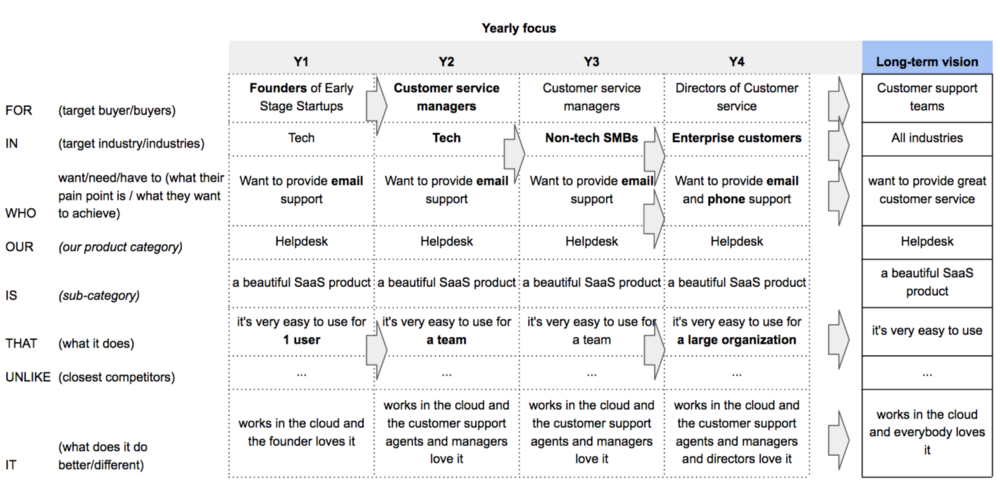
Slowly but surely, your vision will start to consist of tangible, concrete goals. The company’s identity will be intertwined with both your product and culture.
Therefore, just as no two people are the same, no two companies should be either. Each company must develop its own unique identity.
Copying another company would just force values onto employees that don’t align with their work habits or your business model. Ryan Hubbard commented on this as well:

It’s crucial to develop a culture that works for your company. Don’t just copy the practices of another business uncritically. Your identity should be yours alone.
Amazon is a good example. The e-commerce behemoth is famous for its customer obsession and user communication.
Before developing a new feature, developers always look at the project from a user’s point of view, considering what the client wants.
You can see this right away in their website’s section on culture.
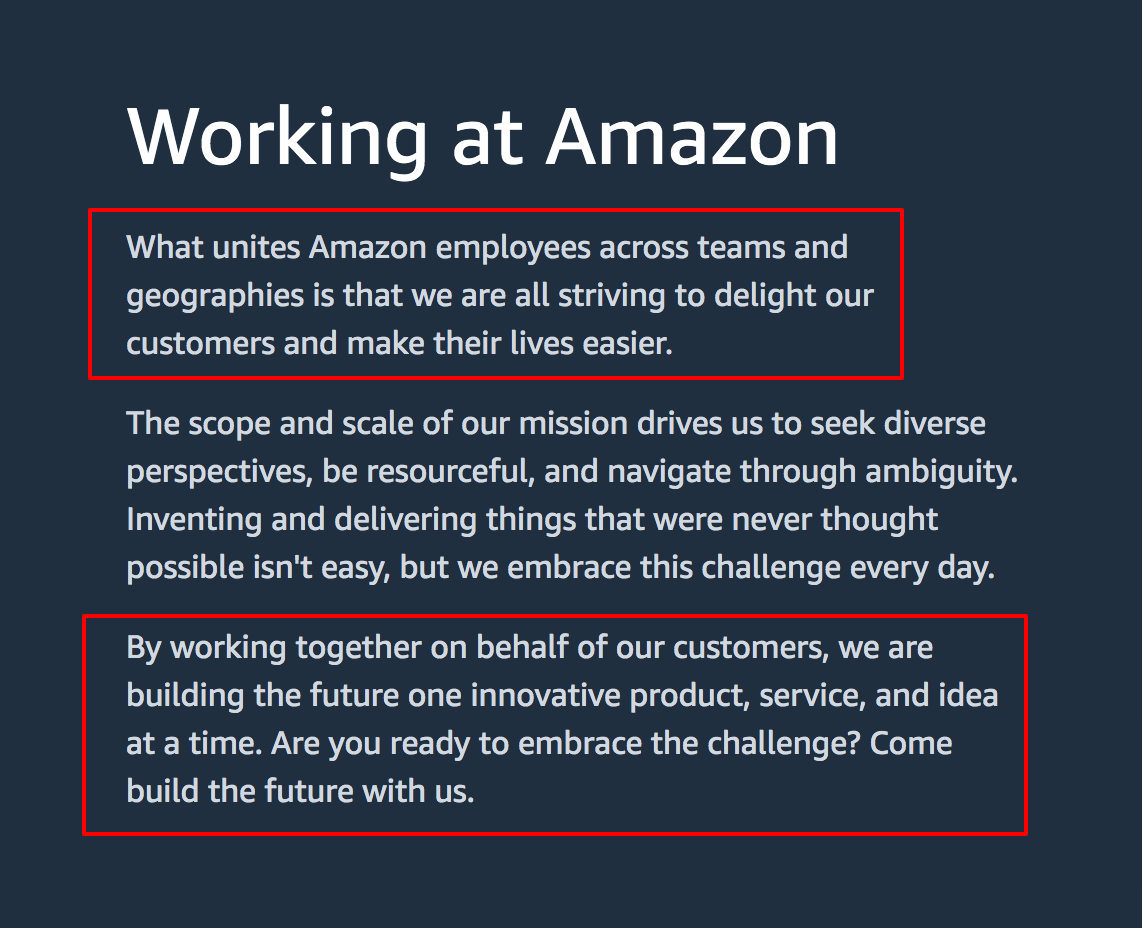
Amazon immediately highlights its devotion to its clients on its careers landing page. That way, candidates get a feel for what the company is all about.
Healthy culture attracts candidates
Another massive benefit of a healthy company culture is that it attracts potential employees. After all, who would choose to work in a company with a bad reputation?
Workers will naturally be more drawn to businesses where they’ve heard the environment is supportive and where they have the freedom to explore their ideas.
A criticizing, restrictive atmosphere will only drive candidates away.
In fact, a recent survey revealed that a vast majority of job seekers are considering culture more and more:
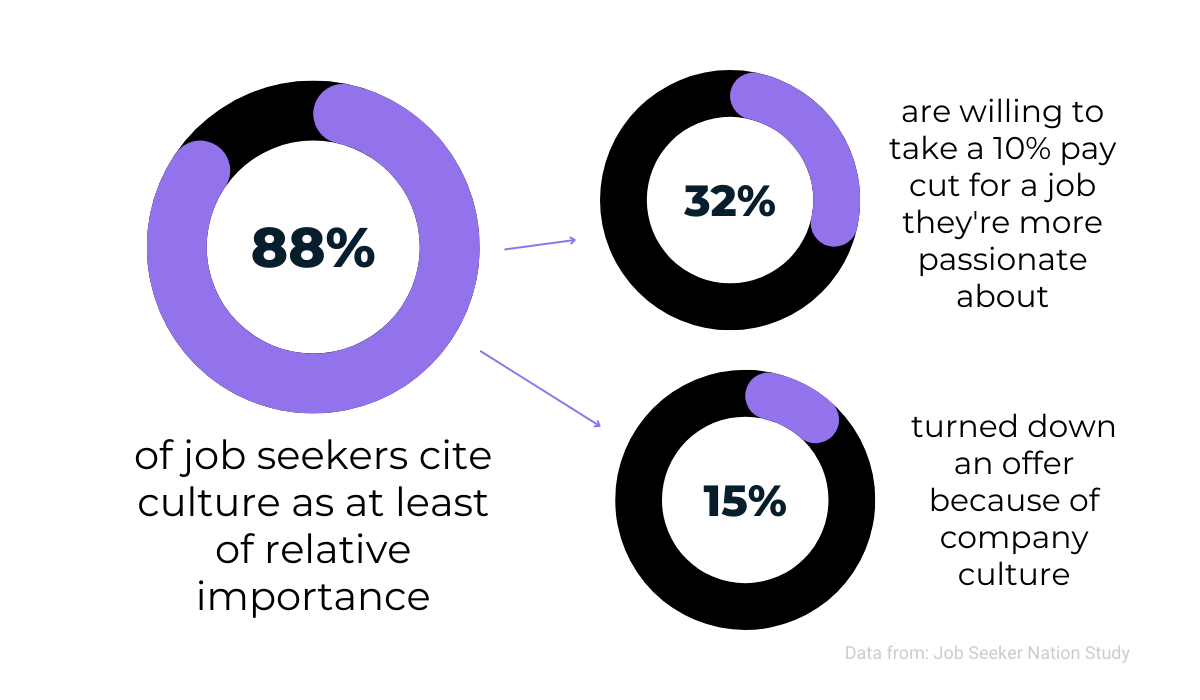
Culture is slowly gaining prominence as more and more candidates take pay cuts to work for a culture that better suits them.
Therefore, to attract talent, you’ll want a strong company culture.
For example, consider Google.
The tech giant emphasizes employee satisfaction, touting inviting offices, near-constant healthy food, and pet-friendly policies—all perks that create a comfortable environment and entice candidates.
Just look at this Glassdoor review:
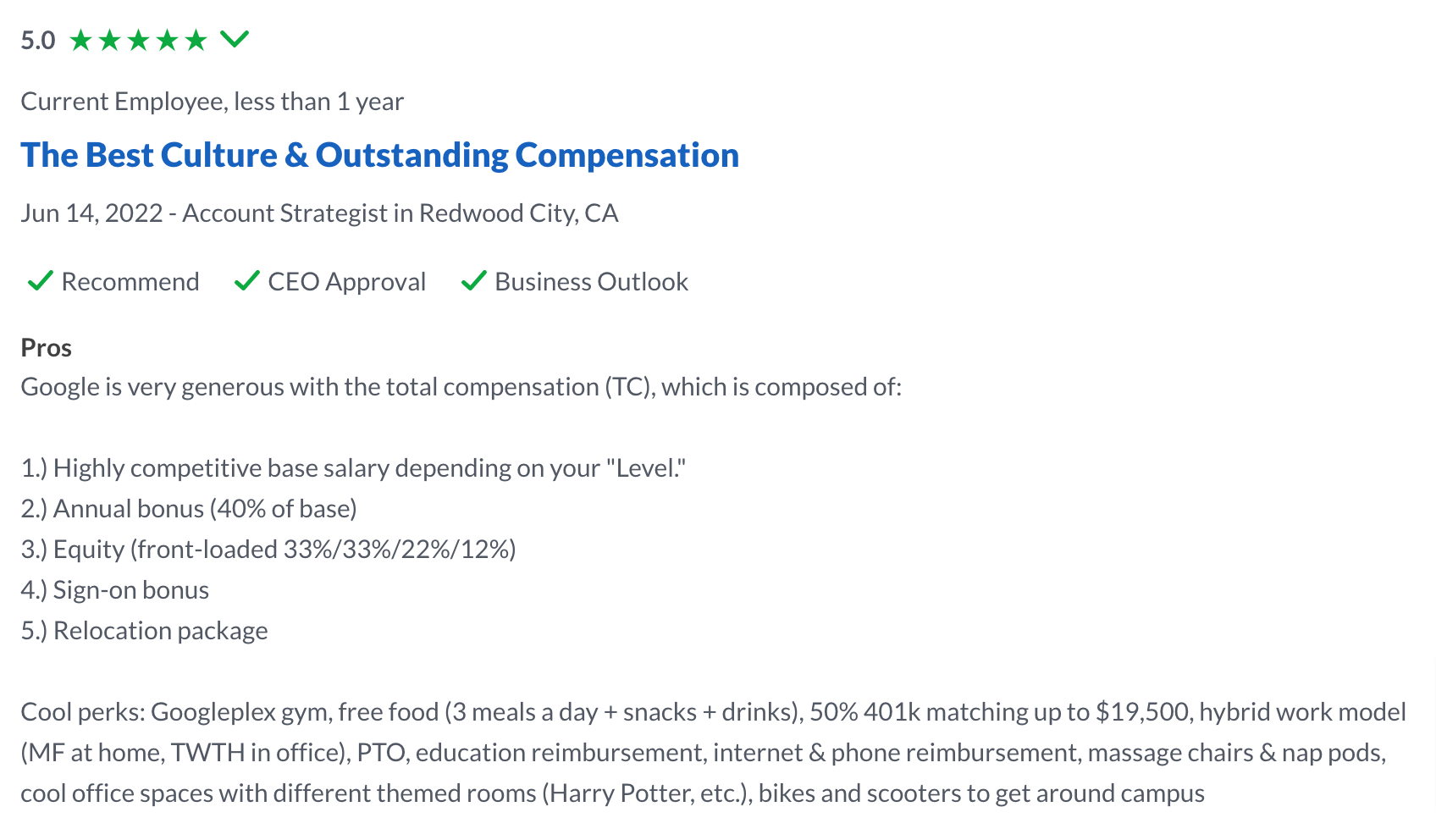
The reviewer has awarded the company with five stars and is thrilled with the benefits it offers, including relocation packages, bonuses, “cool” office spaces, massage chairs, and complimentary food.
These are all aspects that create a pleasant working space—something employees value highly. By offering such perks, companies undoubtedly attract potential employees.
However, there’s more to culture than just free food—mindset and value-system are just as important to most employees, if not more. Take a look at Oracle’s recent tweet:
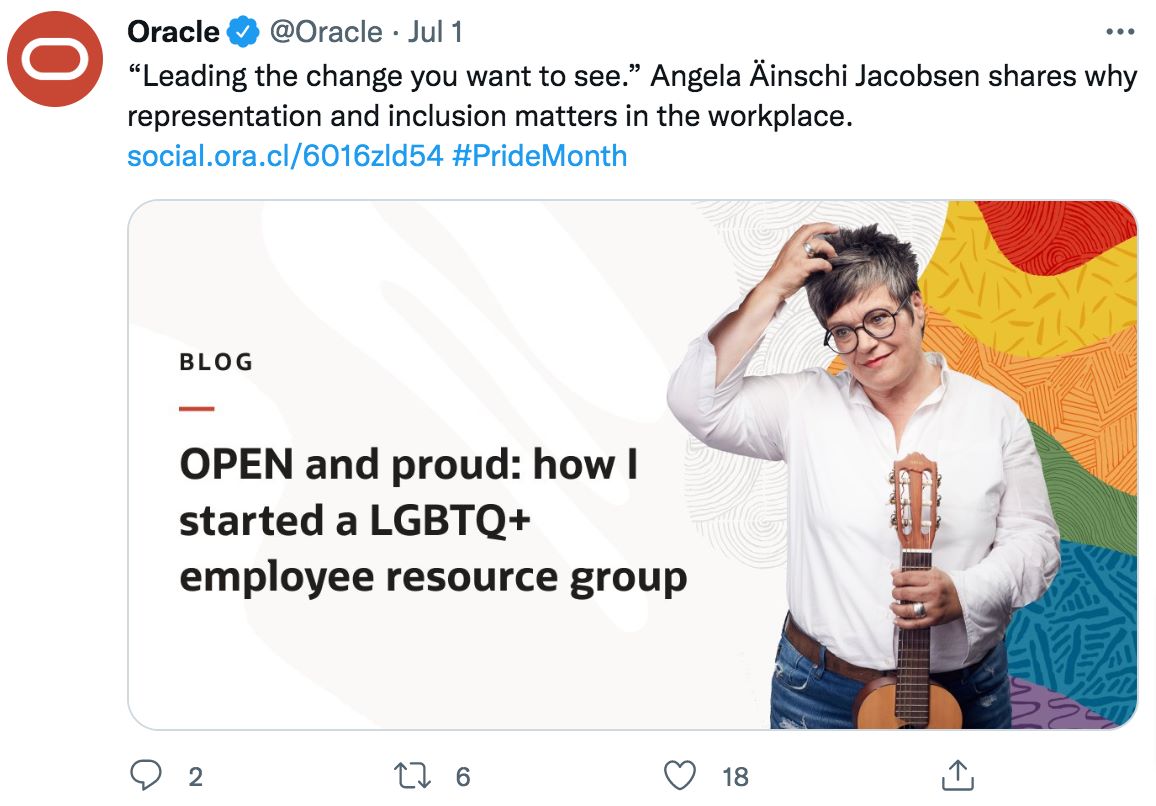
This tweet is an example of a great company culture for two reasons. First of all, it exhibits Oracle’s inclusivity and diversity, demonstrating how the business accepts all sexualities.
This is a meaningful cause for many and proves that the company’s culture is healthy and welcoming—candidates are bound to approve of such a gesture. As Jeffrey Hirsch put it:
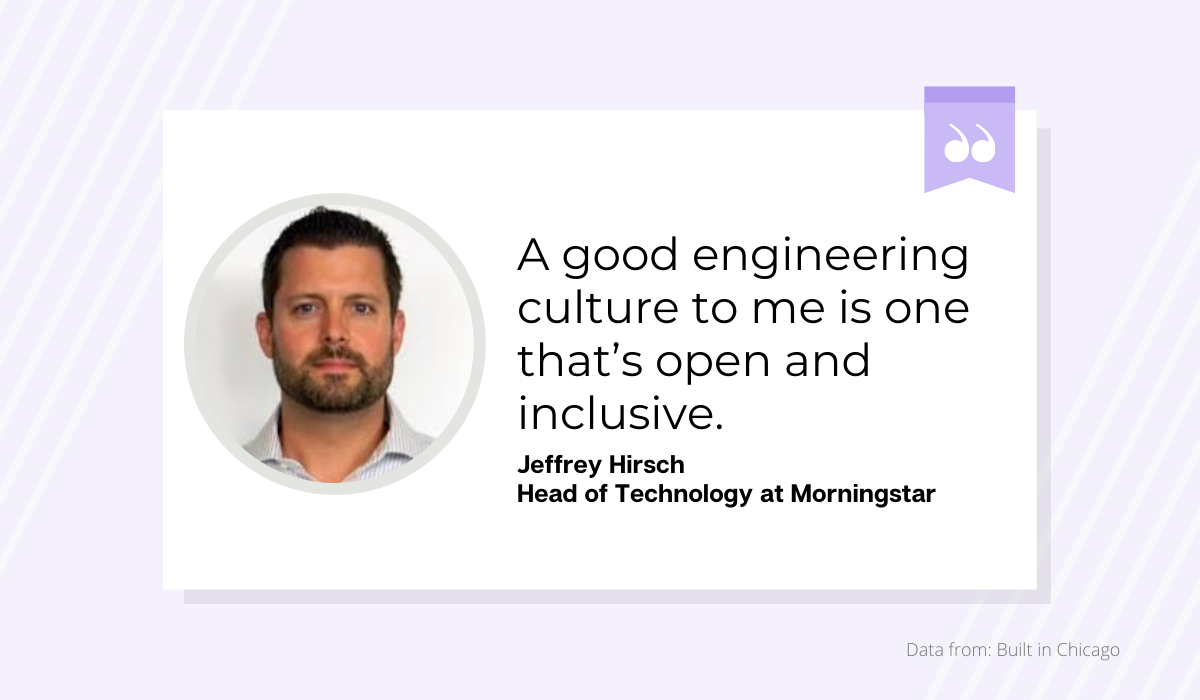
Inclusivity matters and is something candidates will carefully weigh before accepting a job offer.
Furthermore, Oracle makes a point of showcasing their employee, putting her photo in the visual and spelling out her name in the caption.
The blog isn’t a nameless, generic piece written by Oracle.
Instead, it’s a shout-out to the employee and her talents, proving that the firm appreciates her efforts and recognizes its employees.
Culture helps with onboarding
Culture does more than entice possible employees. Once you’ve hired a new talent, healthy company culture will also facilitate the onboarding process.
This is because the onboarding period is your crucial first step to assimilating an employee into your organization.
Through orientation and training programs, you’ll present the company’s core values and goals, and the new recruits should (hopefully) also adopt those values and goals right away.
Stanford professor Charles O’Reilly built upon this notion, emphasizing how culture represents a company’s norms and how employees must gauge if they can adapt to these practices.
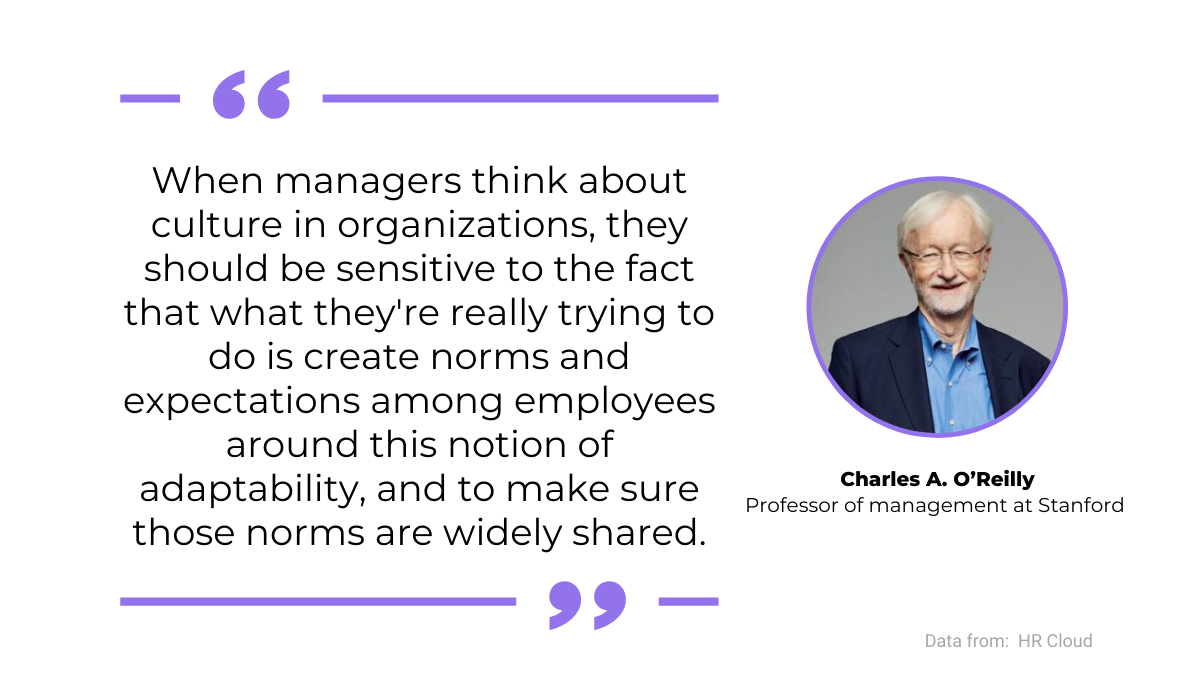
The best place to start sharing these norms is during the onboarding process. That way, company values are ingrained in new employees immediately.
That being said, a professional relationship is reciprocal. The employee needs to suit the company, but the company also needs to suit the employee.
Featuring your culture in the onboarding process actually helps achieve the latter, as you’re very likely to make a favorable first impression—workers appreciate a company that has a clear vision.
In fact, a study recently discovered the following numbers:
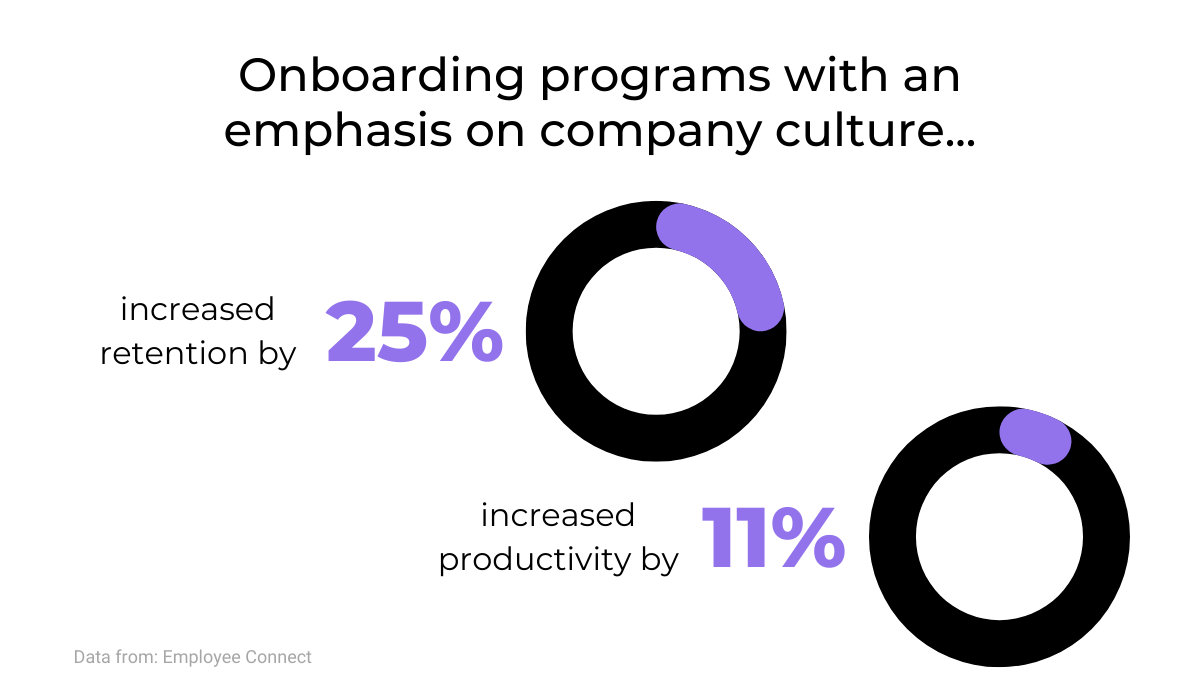
The results show that highlighting culture during onboarding brings about positive results for the company.
It’s also important to keep in mind how new employees take to onboarding.
While they are beginning at the company, they’ll try to mimic and adapt to everything in sight, consciously or unconsciously.
If you haven’t yet defined your culture, so your onboarding is full of inconsistencies, it’ll be more difficult for the new recruit to fit in.
He won’t have a clear role model to follow and might pick up harmful habits.
HubSpot is a fantastic example of how exhibiting the company culture ultimately pays off.
The software company has published its cultural manifesto online—all 128 pages—to the public eye, practicing full-fledged transparency.
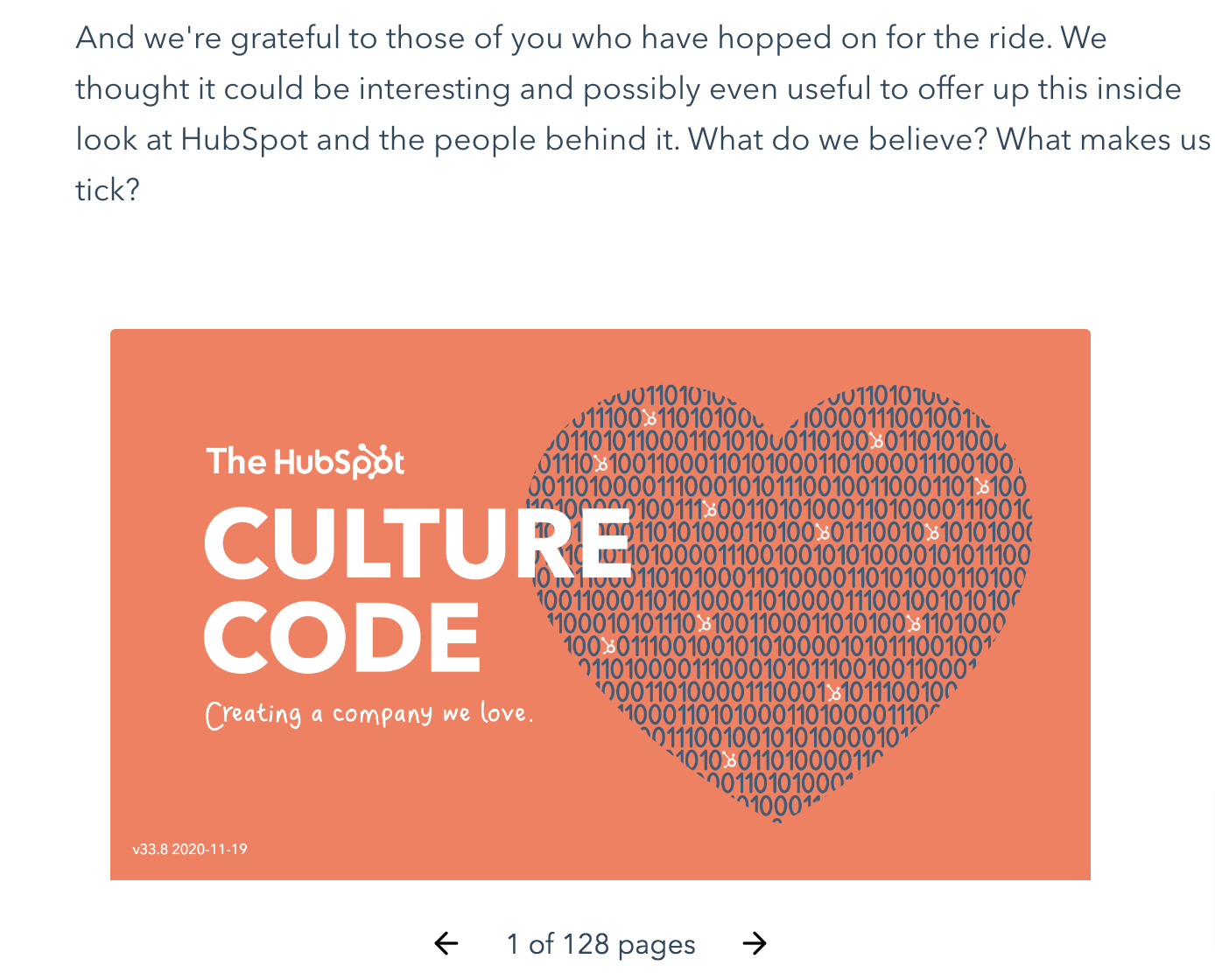
That way, the company’s culture isn’t reserved only for employees but for all interested, possible hires.
However, this bold act has paid off—the company enjoys a 4.6 rating on Glassdoor, which is far above the industry average.
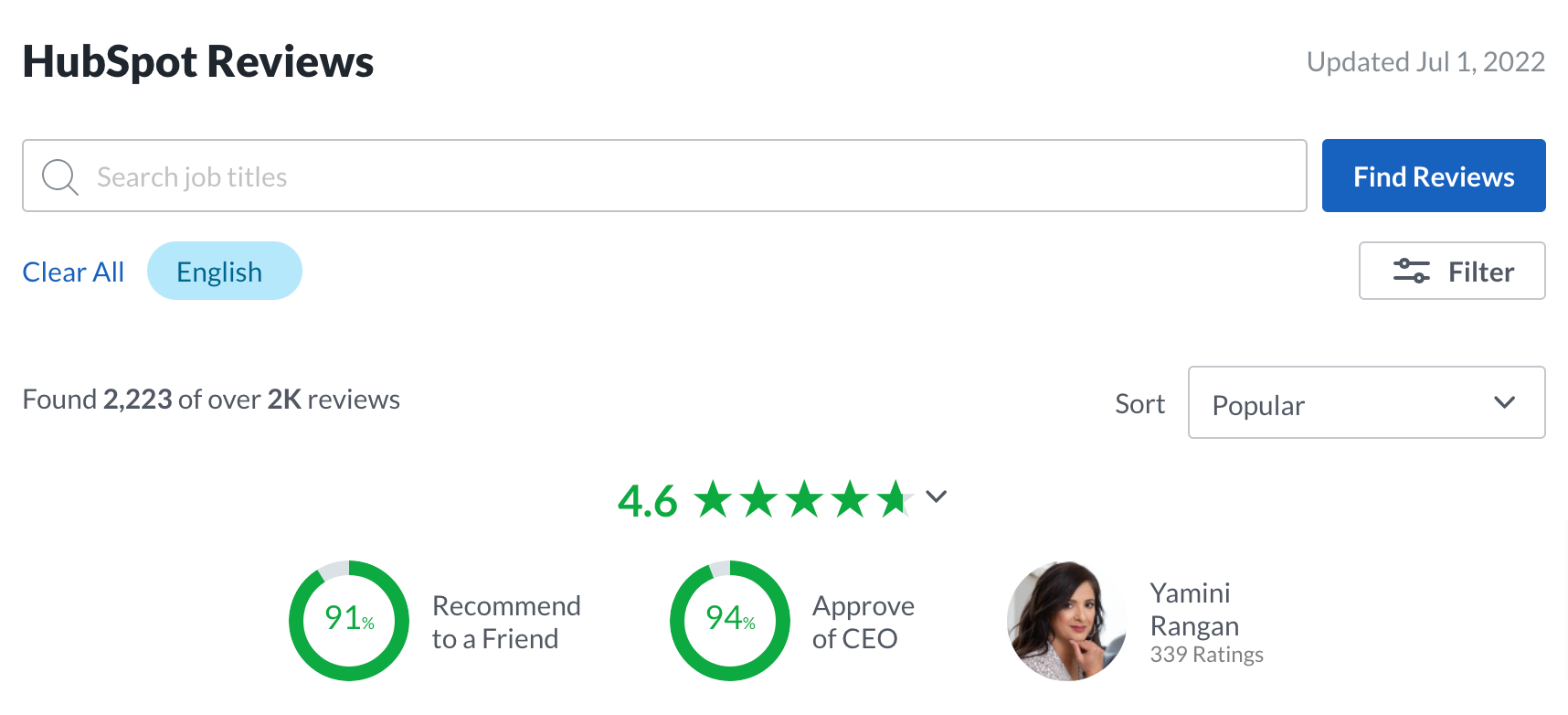
By employing a full-fledged, synchronized effort to convey its culture, HubSpot has managed to secure a reputation as a great employer.
Healthy teams build better products
Healthy company culture often also translates into one invaluable asset— a healthy team. If your team members are happy at work, this should naturally boost company performance.
The Edgar Schein Model even postulates that humane interactions are the main driving force behind a company’s success.
The model theorizes that a corporate culture consists of three levels, depicted below:
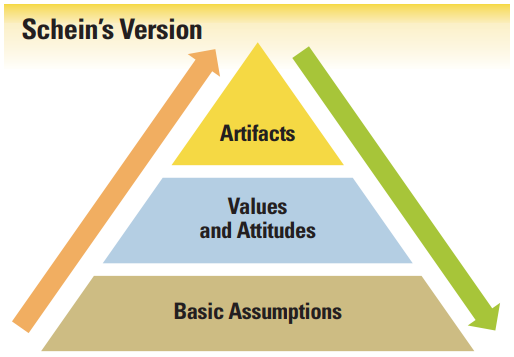
Artifacts are easily-seen elements such as dress code and office furniture.
Values and attitudes refer to sentiments about an organization, such as a mission statement or company values. They provide more insight into a company’s culture than artifacts do.
However, the greatest window into a company’s culture are the basic assumptions under which it operates.
In other words, the underlying beliefs held by employees, most often found exclusively in the subconscious.
They typically constitute polite communication practices, what behavior leads to success, and the like.
For example, a standard assumption in software development is that no one wants to write buggy code.
These basic assumptions also shape collaboration within the company.
This is why a strong culture results in increased engagement and better products—team members instinctively know how to work with one another without having to be taught.
The numbers also prove it, as a vast majority thinks culture takes precedence over strategy.
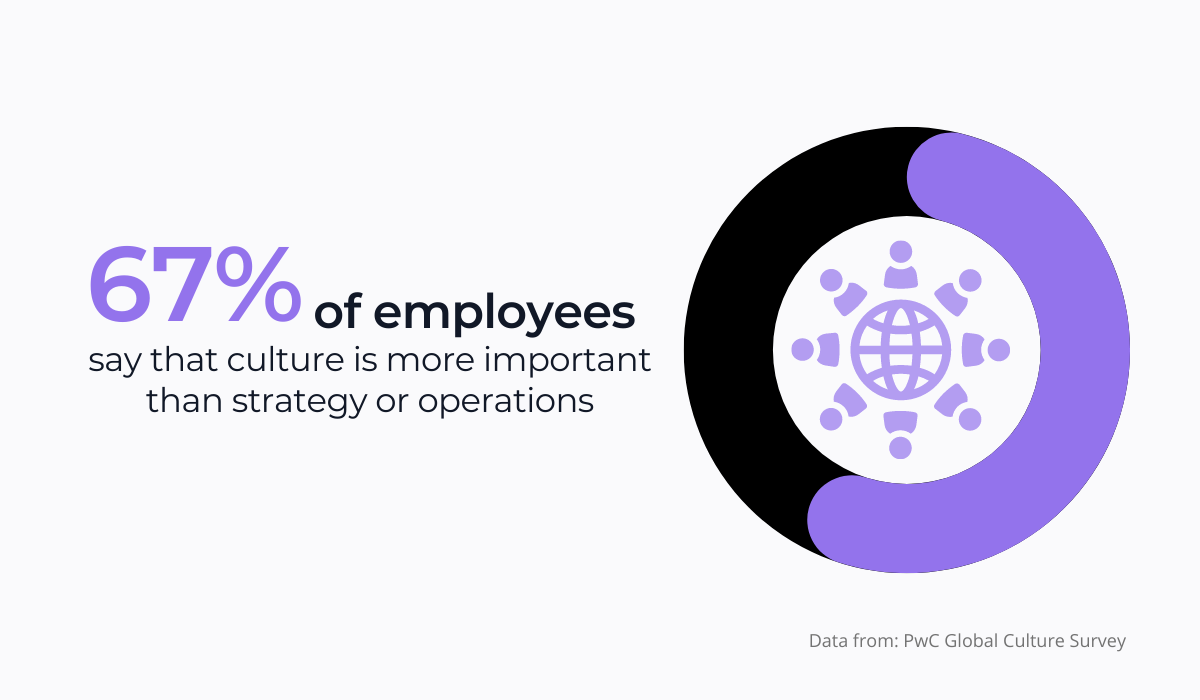
Looking at these statistics, it’s safe to say that culture is the groundwork from which a product is built.
For example, a basic characteristic of a healthy culture would be a continuous commitment to improve one’s work.
This can be realized in multiple ways, such as learning from your colleagues, experimenting with new practices, or even discarding obsolete ideas.
If your company refuses to do even one of these things, it might be time to re-evaluate its culture.
Amin Qazi described a good case in point of ineffective culture:
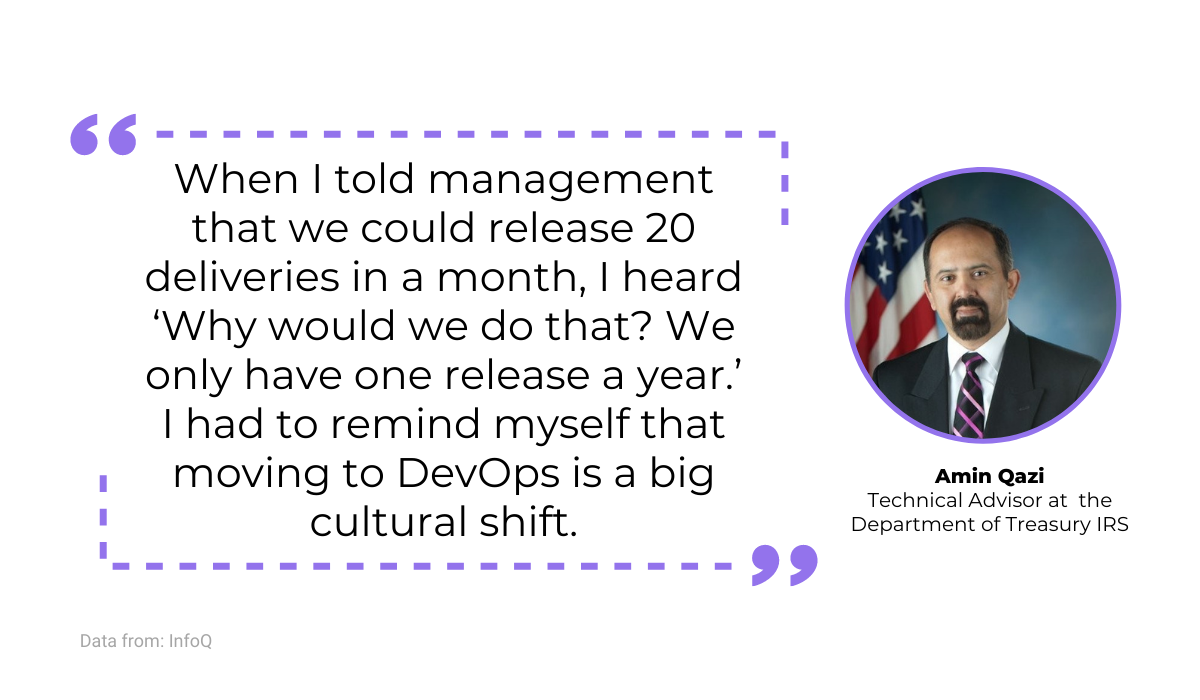
At the time, the IRS had been so entrenched in a particular type of culture that they found it impossible to imagine any kind of change, even positive change.
Amin had to build the culture anew and prove it was beneficial for releasing better products.
Great company culture increases employee retention
Employee retention is also an area where culture can make a significant difference.
In the wake of the Covid-19 pandemic, more and more employees began leaving their workplace as part of The Great Resignation.
Toxic company culture has also played a role, as the number one reason employees leave a company:
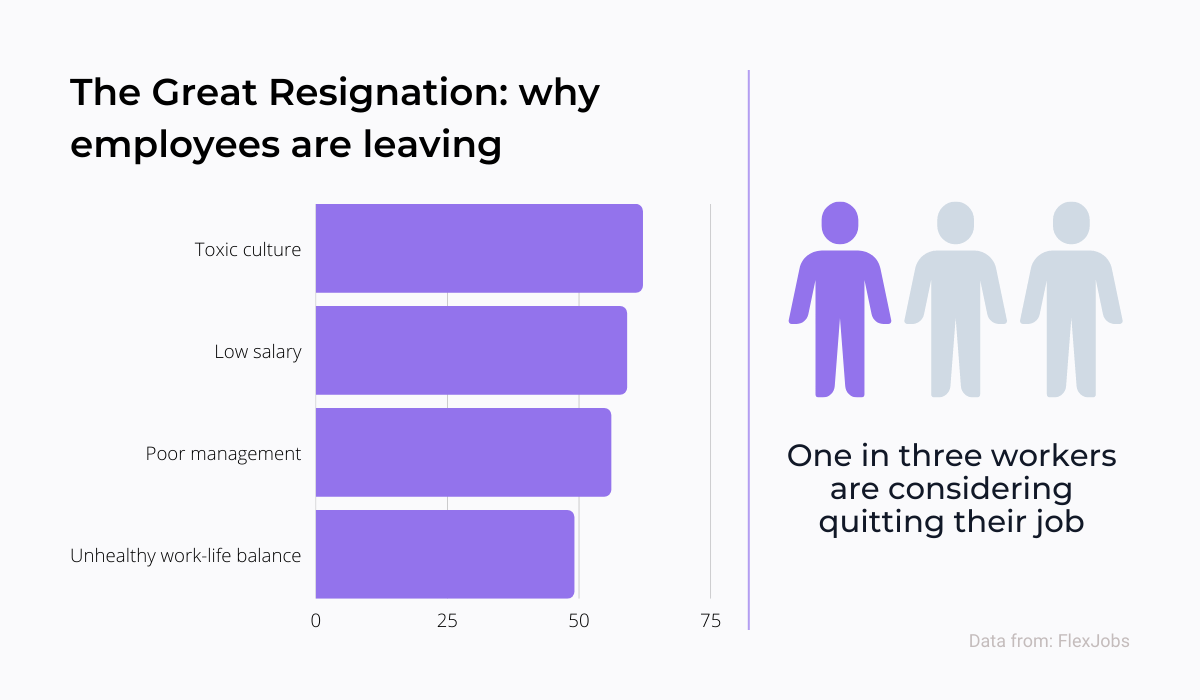
As shown above, an unhealthy culture is the principal reason workers quit their jobs. With that in mind, fostering a positive culture and retaining your team members is vital.
For example, it’s no secret that work-life balance is of enormous importance to most developers, and they tend to remain loyal to companies that recognize their personal life.
If your company offers plenty of paid time off, flexible working hours, and a remote work option, these benefits serve as proof that you trust your employees and care for their wellbeing.
Alyssa Setting, global head of HR at Bullhorn, also highlighted this:
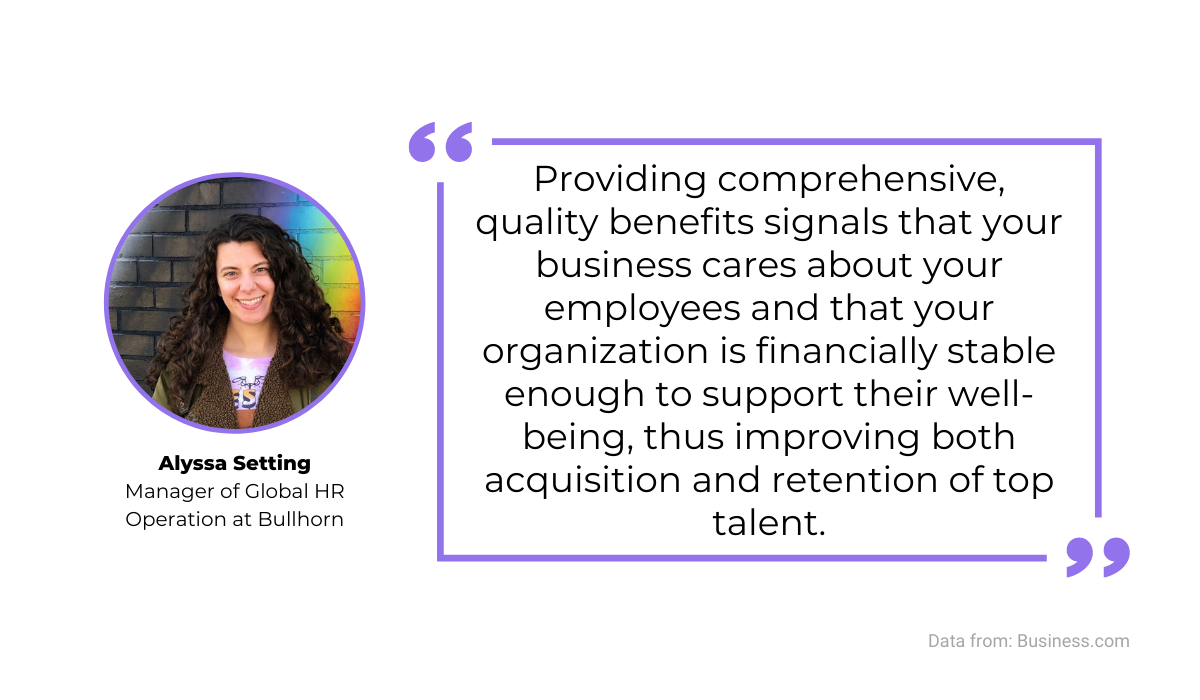
By investing in quality benefits, your business is clearly signaling that its culture places employee satisfaction at the top of its list. Many employees will recognize and appreciate that.
Another prominent reason for employees leaving their jobs, according to a recent McKinsey survey, is that they don’t feel appreciated by their managers.
Company culture can help extinguish those negative emotions.
By creating a culture that empowers employees and celebrates their victories, team members should lose this feeling of detachment.
For example, imagine receiving a personalized happy birthday note or a shout-out on the company’s Intranet after a successful launch.
These small gestures can go a long way in making employees feel valued.
LinkedIn is an excellent example of investing in its employees.
Once a month, they host an InDay—a month for employees to focus exclusively on themselves and disconnect from their professional lives.
Each month has a theme, be it wellness, community, or similar. The video below showcases the event:
By hosting these culture-filled events, employees feel a sense of belonging and realize that they are more than cogs in a machine in the eyes of their company.
Strong cultures respond better to challenges
Last but not least, companies with a healthy culture tend to rise to challenges better.
Teams foster a strong connection between employees, which allows them to overcome any obstacles deftly.
Even in extreme situations where there are no adequate guidelines and resources, it’s the culture that can drive the team forward.
When all else fails, employees can rely on one another when devising solutions. Rodolfo Carmona from 3Pillar also commented on how valuable a trait creativity is.
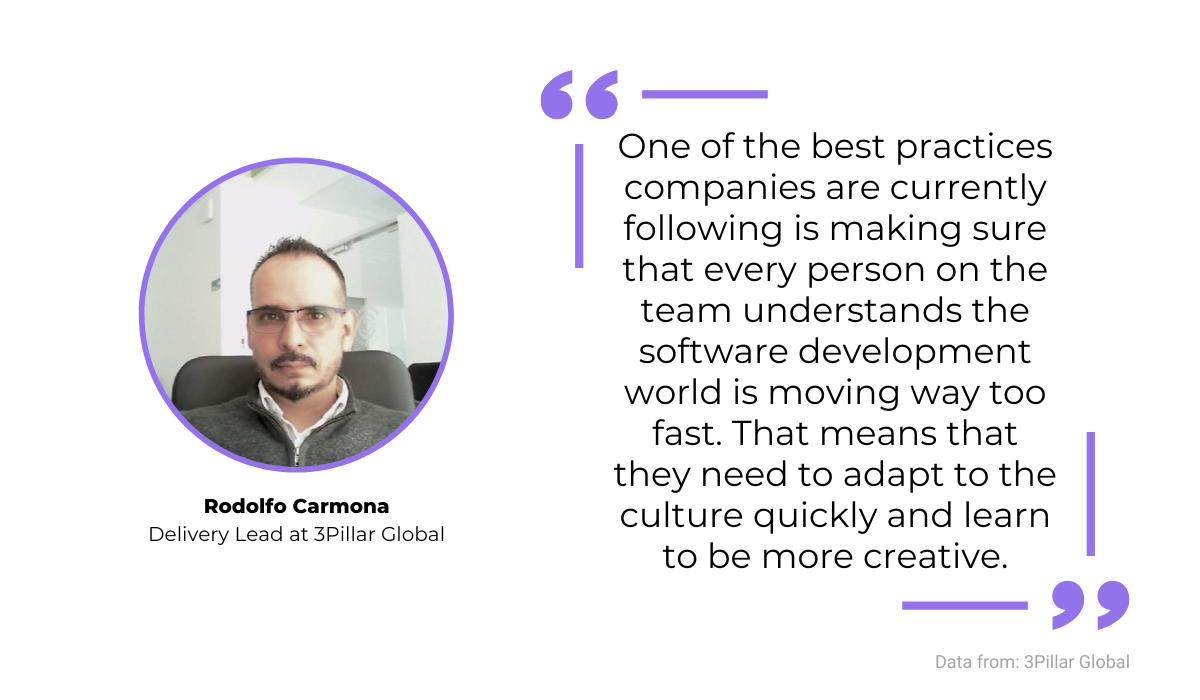
A strong sense of community and innovation helps solve issues, and this is something that is installed in a strong culture.
For example, it’s not unusual for developers to abandon bugs after trying a few haphazard attempts at fixing them.
When you’re surrounded by that mindset, it’s difficult to break out of such a defeatist culture.
However, if team members are determined to solve issues, the other employees will feel energized by their commitment.
Some bugs only surface after a program runs for a few hours or days. These types can take days or weeks to solve.
Nevertheless, if everyone is involved, there’s a smaller chance of giving up, as everyone approaches the problem from multiple perspectives and with a positive attitude.
In fact, almost 80% of companies that focus on culture show great results:
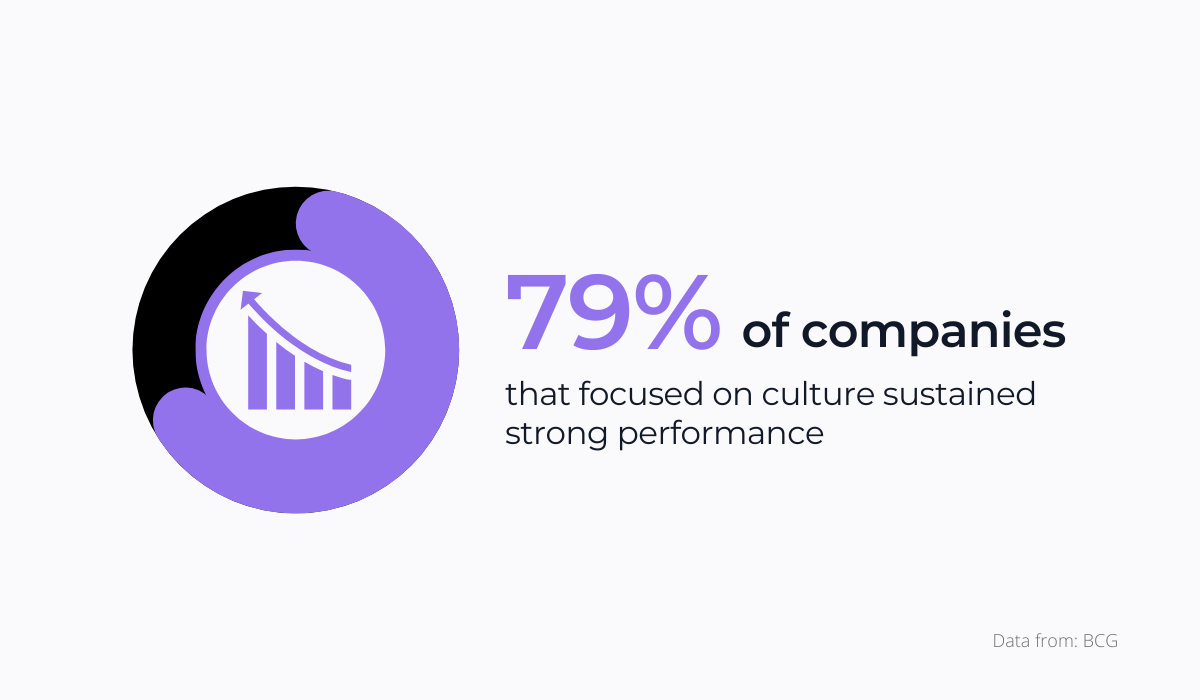
By fostering a strong culture, companies are much more likely to overcome challenges.
Valve is a company with a particularly radical company culture. There is no such thing as a defined role.
Projects are assigned arbitrary teams, but those teams are dissolved once the project is over. At the end of the day, the only actual task is to find the most valuable work and then do it.
There are no defined processes, only an emphasis on constant improvement.
This philosophy is also outlined in their handbook:
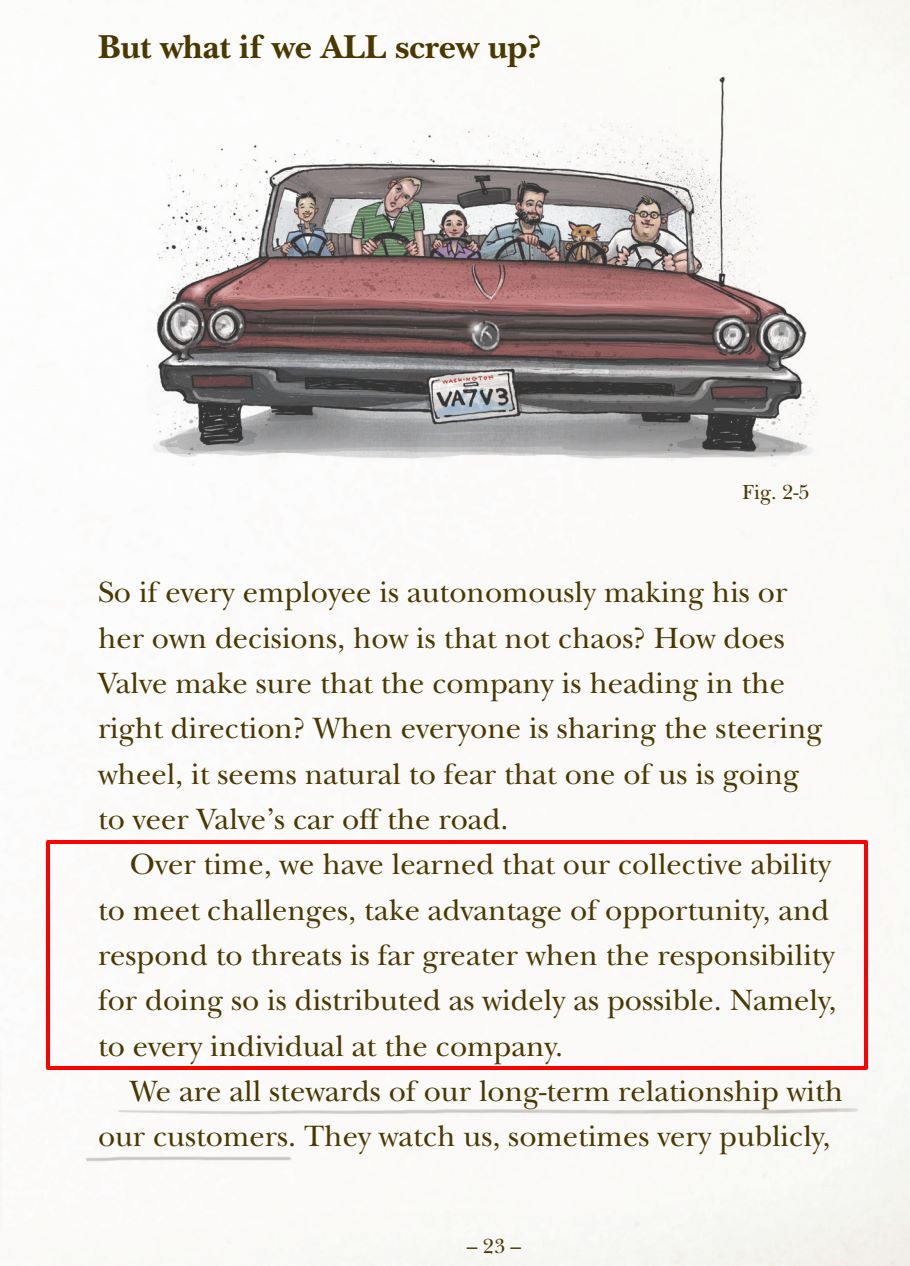
By spreading the responsibility equally to all employees, workers at Valve are especially motivated, and objectives and challenges emerge organically and are then solved in a joint effort.
Conclusion
Creating a winning software development culture is an investment in your company’s future.
The entire employment cycle is deeply embedded with a company’s culture, from attracting candidates to retaining them.
Furthermore, companies with a strong culture build better products and do it faster. They’re also likely to conquer any obstacles.
Finally, a company culture shapes a software development team’s very identity.
All of these aspects are crucial reasons as to why culture matters to software development companies. We hope you realize this and take the time to grow your own company’s culture.




